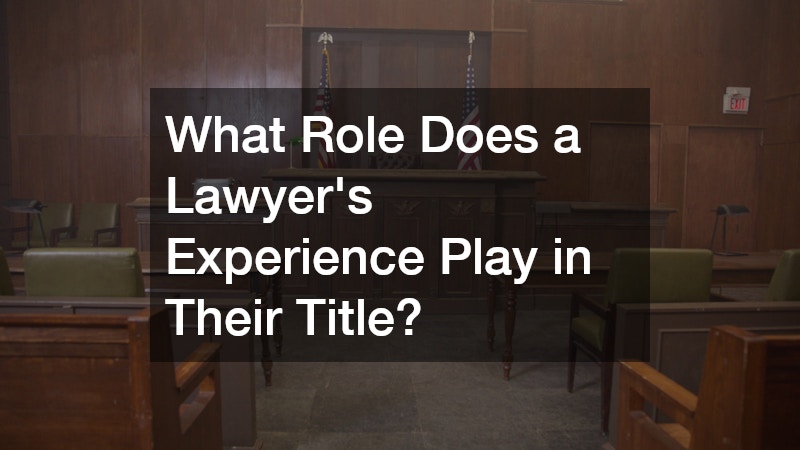Navigating the legal world can be confusing, especially when it comes to understanding the various lawyer titles and what they actually mean. Whether you need the best divorce lawyer, a criminal defense attorney, or advice from a personal injury law office, knowing the differences in titles can help you find the right legal representation. Lawyer titles are more than just labels—they often reflect a professional’s specialization, experience, and the type of services they offer.
Many people confuse the terms lawyer, attorney, and other titles, leading to misunderstandings that can complicate choosing the right legal help. Additionally, the law firm or personal injury law office you choose, or whether you need a bilingual lawyer or a specialist in foreclosure law, can significantly impact your case outcome. This article will clarify these titles, explain how specializations shape lawyer roles, and provide practical advice to identify the best attorney for your unique needs.
Understanding lawyer titles is crucial, especially when your legal issues range from divorce and criminal defense to foreclosure law or even situations involving alcohol rehab. This guide breaks down common titles, explores certifications, and discusses how to select an attorney with the right expertise for your case.
What Do Different Lawyer Titles Mean?

Understanding Basic Lawyer Titles
At the most fundamental level, the terms lawyer and attorney are often used interchangeably, but they have subtle distinctions. A lawyer is someone who has studied law and is qualified to offer legal advice. An attorney, specifically an attorney at law, is a lawyer who is authorized to represent clients in court.
The title Esquire is another common term seen after lawyers’ names, especially in the United States. It’s a courtesy title indicating the person is licensed to practice law. While it doesn’t convey specific expertise, it does confirm the individual’s legal credentials.
The Role of Specialization in Legal Practice
Lawyer titles often reflect a lawyer’s area of specialization. For example, a personal injury lawyer focuses on cases involving injuries caused by accidents or negligence, often working within a personal injury law office. Similarly, a criminal defense attorney specializes in defending clients accused of crimes, while the best divorce lawyer or best divorce attorneys concentrate on family law and custody matters.
Specialization affects the services provided and the lawyer’s experience with particular types of cases. Choosing a lawyer with the right specialty is essential for legal success and can improve your chances of a favorable outcome.
Importance of Titles in Legal Contexts
Titles matter because they communicate a lawyer’s qualifications, area of practice, and role within a law firm or legal system. For instance, knowing whether you’re dealing with a bilingual lawyer can be vital if language barriers might complicate your case.
Moreover, specific titles indicate the lawyer’s authority and responsibilities. For example, a foreclosure law specialist focuses on property and lending disputes, which differ greatly from what a criminal defense attorney handles. Understanding these distinctions helps set client expectations and guides you toward the appropriate legal support.
What Is the Difference Between a Lawyer and an Attorney?
Definitions of Lawyer and Attorney
While often used synonymously, the distinction between lawyer and attorney is subtle but important. A lawyer is a person who has legal training and education, qualified to offer legal advice. An attorney takes the additional step of being licensed to practice law and represent clients in court.
All attorneys are lawyers, but not all lawyers act as attorneys. Some may work in legal consultancy or advisory roles without courtroom responsibilities.
Roles and Responsibilities
Lawyers typically provide legal advice, draft documents, and assist clients in understanding their rights. Attorneys actively represent clients in legal proceedings, negotiate settlements, and argue cases before judges or juries.
For example, a criminal defense attorney defends clients facing criminal charges, while a personal injury lawyer might negotiate compensation without ever going to trial. Understanding this helps clients know what to expect from their legal representative.
Common Misconceptions
Many believe the terms lawyer and attorney are fully interchangeable, but in some jurisdictions, the distinction affects legal representation rights. Additionally, people often assume a “lawyer” title guarantees courtroom experience, which isn’t always the case.
These misconceptions can lead to confusion, especially when selecting specialists like the best divorce lawyer or criminal defense attorney. Knowing the difference helps clients seek appropriate counsel.
How To Identify a Specialist Lawyer?
Types of Legal Specializations
Law is a broad field, with lawyers specializing in areas like family law, personal injury, criminal defense, foreclosure law, and more. For example, a personal injury lawyer focuses on cases related to accidents and injuries, often found in a personal injury law office, while a foreclosure law specialist helps clients facing property repossession.
Specialists like bilingual lawyers provide services in multiple languages, essential for clients needing clear communication. Criminal defense attorneys handle cases involving alleged criminal behavior, while lawyers involved in alcohol rehab cases often focus on legal issues surrounding substance abuse.
Checking Qualifications and Certifications
When looking for a specialist, verifying their qualifications is key. Check if the lawyer is licensed in your state and if they hold certifications in their specialty. Many states offer board certifications or memberships in specialty legal associations.
A reputable law firm or personal injury law office will usually provide information about their attorneys’ credentials. This transparency helps you confirm you’re hiring an expert suited to your case.
Benefits of Hiring a Specialist
Specialists bring focused knowledge and experience, improving your chances of a favorable outcome. For example, the best divorce attorneys understand nuances in family law that general practitioners may miss.
Hiring a foreclosure law expert is critical if facing property disputes, while criminal defense attorneys offer strategies tailored to criminal law. Specialists like bilingual lawyers can also bridge communication gaps that could otherwise hinder your case.
What Are Common Lawyer Titles for Different Practices?

Corporate Attorneys
Corporate attorneys advise businesses on legal matters such as contracts, mergers, compliance, and intellectual property. They typically work within law firms or as in-house counsel for corporations.
While they rarely appear in public litigation, their role is essential in preventing legal disputes and managing business risk.
Family Lawyers
Family lawyers specialize in issues like divorce, child custody, adoption, and domestic violence. The best divorce lawyer or best divorce attorneys are critical in navigating emotionally charged and legally complex family matters.
They often provide mediation services and help clients negotiate settlements outside court, though courtroom representation is also common.
Criminal Defense Attorneys
Criminal defense attorneys defend individuals accused of crimes, ranging from misdemeanors to felonies. Their role is to protect clients’ rights, challenge evidence, and negotiate plea deals or represent clients at trial.
This title carries significant responsibility and often involves high-stakes cases impacting personal freedom.
What To Expect From a Legal Consultant?
Defining Legal Consulting
Legal consultants provide expert advice without representing clients in court. They analyze legal issues, review contracts, or advise on compliance but do not engage in litigation.
Legal consulting is common in specialized areas, such as corporate governance or regulatory affairs.
Differences Between Consulting and Representation
Unlike attorneys who advocate in court, legal consultants provide guidance and recommendations. They might help a law firm prepare for a complex case or assist a company with regulatory filings.
This distinction is important when deciding the kind of legal help you need, especially if you require courtroom representation or just advisory services.
When To Hire a Legal Consultant
If your case involves complex legal questions but no immediate litigation, a legal consultant might be sufficient. For example, a business seeking foreclosure law advice or a company needing compliance help may prefer consultants.
However, for personal injury claims or criminal defense, hiring attorneys who can represent you fully is usually necessary.
How Do Certifications Affect a Lawyer’s Title?
Understanding Legal Certifications
Certifications signal that a lawyer has met additional standards beyond basic licensing. For example, some states offer board certifications in areas like family law, criminal defense, or personal injury law. These certifications demonstrate advanced expertise, which can be especially valuable when searching for the best divorce lawyer or personal injury lawyer.
Certifications vary by jurisdiction but often require passing exams, peer reviews, and proving experience in the specialty.
Impact on Credibility and Reputation
Holding certifications enhances a lawyer’s credibility and reputation among clients and peers. A certified criminal defense attorney or a lawyer specializing in foreclosure law may inspire more confidence because of their recognized expertise.
When hiring from a law firm, look for certifications as a sign of commitment to professional excellence.
Navigating Certifications for Your Needs
Depending on your legal issue, certain certifications will matter more. For family matters, a certified divorce attorney brings reassurance. If you face criminal charges, a certified criminal defense attorney’s knowledge can be pivotal.
If language barriers exist, finding a bilingual lawyer with certifications can ease communication challenges. Always ask about certifications during your initial consultation to assess fit.
What Are the Implications of a Lawyer’s Title?

Legal Authority Associated with Titles
Different lawyer titles come with different legal authorities. For instance, while all attorneys can represent clients in court, not all lawyers have the same courtroom experience or ability to handle complex litigation.
Titles like “partner” at a law firm may indicate seniority but don’t necessarily convey specialization or courtroom skills. Meanwhile, titles such as “criminal defense attorney” or “personal injury lawyer” reflect areas of authorized practice.
Titles and Client Expectations
A lawyer’s title sets expectations for their expertise and services. Clients looking for the best divorce attorneys anticipate deep knowledge of family law and negotiation skills. Meanwhile, someone consulting a foreclosure law specialist expects expertise in property law and lender disputes.
Misunderstandings about titles can lead to mismatched expectations and frustration, so clarity at the outset is essential.
Addressing Title Misunderstandings
Many people confuse titles like lawyer, attorney, counselor, and legal consultant. It’s important to clarify roles when hiring legal help. For example, hiring a legal consultant instead of an attorney when you need court representation could be a costly mistake.
Knowing what a title truly means helps clients avoid these pitfalls and find the right fit.
How To Choose the Right Attorney For Your Case?
Evaluating Your Legal Needs
Before hiring, assess your legal needs carefully. Do you require courtroom representation or legal advice? Is your case related to divorce, personal injury, criminal charges, or foreclosure law?
Clarifying your needs helps narrow the search to attorneys with relevant specialties, like the best divorce lawyer for family law or a criminal defense attorney for criminal cases.
Researching Attorney Backgrounds
Look into potential attorneys’ backgrounds by reviewing their education, certifications, years of experience, and case history. Visiting law firm websites or personal injury law office pages often provides this information.
Don’t hesitate to check online reviews or request references to gauge client satisfaction.
Criteria for Making the Choice
Important factors include expertise, communication skills, fees, and availability. A bilingual lawyer might be crucial if English isn’t your first language. The best divorce attorneys often offer personalized attention and flexible scheduling.
Trust your instincts during consultations and choose someone you feel comfortable with.
Are Lawyer Titles Regulated Differently By State?
Overview of Legal Regulation
Lawyer titles and licensing are regulated by state bar associations, which set requirements for education, exams, and ethics. These bodies ensure that lawyers meet professional standards before using certain titles.
Knowing your state’s regulations can help you understand the significance of titles and avoid unqualified practitioners.
Variations Across States
Titles can differ across states. For example, some states use the term solicitor, while others say attorney. Certain certifications or special designations may only be recognized locally.
These variations mean that a lawyer’s title in one state might not have the exact same meaning elsewhere, affecting your choice if you’re hiring out of state.
Impact on Legal Services
State regulations influence the availability of specialists and the authority granted by titles. This can impact access to legal services, especially for niche fields like foreclosure law or alcohol rehab-related legal matters.
It’s important to ensure your chosen lawyer is fully licensed and authorized in your jurisdiction.
What Role Does a Lawyer’s Experience Play in Their Title?

Mandatory Experience Levels
Some titles or certifications require minimum years of practice. For example, to be recognized as the best divorce lawyer or a certified personal injury lawyer, a minimum case volume or experience level may be necessary.
Experience requirements ensure attorneys have handled enough cases to develop expertise.
Experience vs. Title Prestige
While prestigious titles can impress, they don’t always guarantee superior results. Sometimes a less flashy lawyer with hands-on experience in your exact legal issue is the better choice.
Balancing experience with specialization matters more than chasing titles alone.
Balancing Experience and Specialty
For example, an experienced criminal defense attorney who has handled numerous felony cases will likely serve you better than a general lawyer with a grand title but little relevant experience.
Prioritize attorneys whose experience aligns closely with your case type.
Conclusion
Understanding lawyer titles is essential for anyone seeking legal assistance. These titles provide clues about a lawyer’s qualifications, specialization, and the services they can offer. Whether you need the best divorce lawyer, a criminal defense attorney, or advice from a personal injury law office, decoding titles helps you find the right fit for your legal needs.
It’s important to consider not only titles but also certifications, experience, and the reputation of the law firm or personal injury law office representing you. Don’t overlook practical factors like language skills, especially if a bilingual lawyer could improve communication. Likewise, when facing specific challenges like foreclosure law or alcohol rehab-related issues, specialized knowledge is vital.
By carefully evaluating lawyer titles, certifications, and areas of expertise, you empower yourself to make informed decisions. This knowledge ultimately leads to better legal outcomes and greater peace of mind throughout your legal journey.





